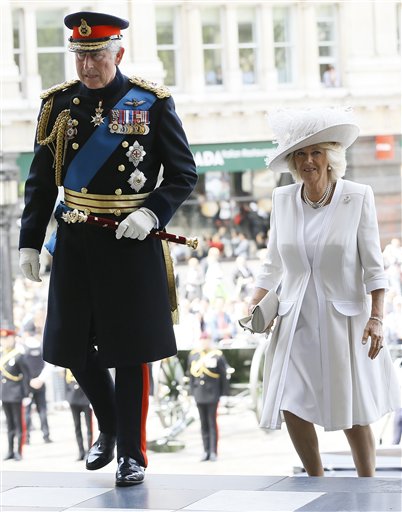
Britain’s Prince Charles and Camilla, The Duchess of Cornwall, arrive to attend a commemoration service for the Battle of Waterloo, at St Paul’s Cathedral in London, Thursday, June 18, 2015. AP
BRUSSELS — Royalty, dignitaries and soldiers around the world on Thursday commemorated the 1815 Battle of Waterloo, a watershed in European history that marked the end of the continent’s domination by France and its emperor Napoleon and the beginning of the British century.
Belgium’s King Philippe led a ceremony for hundreds of guests and thousands of re-enactors gathered under the Lion’s Mount monument at the Waterloo battle site exactly 200 years after more than 10,000 soldiers died in a half-day battle between French troops and an international coalition led by Britain’s Duke of Wellington.
Belgian Prime Minister Charles Michel said “the enemies of yesterday have become staunch allies” after descendants of the top military leaders of that battle shook hands on the very grounds where their ancestors had fired guns and cannons at one another.
Even if royalty and nobility from several of the 1815 belligerents attended the ceremony just south of Brussels, France only sent a lower-key delegation. Paris had already strongly objected earlier this year to the minting of a commemorative Waterloo coin.
But the victors, especially Britain, had a field day. Prince Charles came to the battlefield on Wednesday, then was joined by Prime Minister David Cameron at a Waterloo commemorative service Thursday at St. Paul’s Cathedral in London. Descendants of those who fought, including the 9th Duke of Wellington, also marked the occasion at a service, which featured readings of extracts offering accounts of the battle.
“This anniversary means a great deal. The battle changed history. Had we not won, we probably would be speaking French now,” said Squadron Sergeant Major Tony Gray, 76, of the Light Cavalry.
St. Paul’s is the resting place of the first Duke of Wellington, who led the British troops in 1815.
And at NATO facilities in Kabul, Afghanistan, British and other NATO soldiers also marked one of the most famous battles in history.